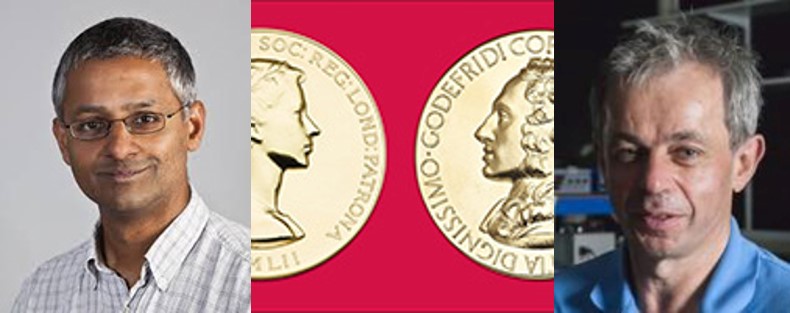
Shankar Balasubramanian FMedSci FRS and David Klenerman FMedSci FRS have been jointly awarded a prestigious Royal Medal for their co-development of DNA sequencing techniques transforming biology and genomic medicine.
The Royal Medals are one of the Royal Society’s premier awards and are made on behalf of the Queen each year. Awarded annually since 1825, this year’s recipients of the three Royal Medals join the ranks of Fred Sanger, Max Perutz and Francis Crick.
Professor Sir Shankar Balasumbraminian and Professor David Klenerman, who are members of the Centre's Early Detection Programme, have been honoured for their outstanding contribution to applied sciences. They invented Next Generation Sequencing (NGS), which has made routine, accurate, low-cost genome sequencing a reality, revolutionising biology and providing unprecedented insights into the cancer genome.
Professor Sir Shankar Balasubramanian FMedSci FRS, Department of Chemistry and CRUK Cambridge Institute said: “I feel hugely honoured to be awarded the Royal Medal and it is humbling to see the previous recipients. I am deeply thankful to the many co-workers and collaborators who have made my scientific explorations so enjoyable and fruitful and continue to do so.”
Professor David Klenerman FMedSci FRS, Department of Chemistry added: “The development of Solexa sequencing was a massive team effort and would not have been possible without the collective contribution of a wide number of highly talented individuals. I am delighted that this achievement has been recognised by this award.”
Shankar Balasubraminian has laboratories in the Department of Chemistry and the Cancer Research UK Cambridge Institute. His research is focused on elucidating the chemistry, structure and function of DNA and RNA. His group aims to address questions of central importance to this field from a multitude of perspectives that comprise chemical, biological and computational approaches.
His laboratory at the CRUK Cambridge Institute is the focus for experiments involving cell and molecular biology, genomics and medicine, which is complemented by the organic chemistry and molecular biophysics expertise in the Department of Chemistry. There are currently two main thematic areas of study in the lab. The first is structures that form in DNA and RNA with an emphasis on G-quadruplexes. The second is chemically modified bases in DNA.
While the focus of Shankar's group is to carry out basic exploratory research, incidental findings have led to inventions from the laboratory that have been commercialised. These include a method for decoding DNA called Solexa-Illumina sequencing, that is being widely applied in the life sciences and for human genome sequencing. A second example is chemistry for decoding epigenetic and other modified bases in DNA, commercialised via Cambridge Epigenetix.
David Klenerman’s group, based in the Department of Chemistry, develop and use physical techniques to answer important biological questions. Through the use of single-molecule methodology, they are researching biological problems ranging from how neurodegenerative diseases occur to how immune responses are triggered.
They use various fluorescence spectroscopy techniques, such as confocal and TIRF microscopy, in addition to super-resolution methodologies.The group also develop and use scanning ion conductance microscopy.















